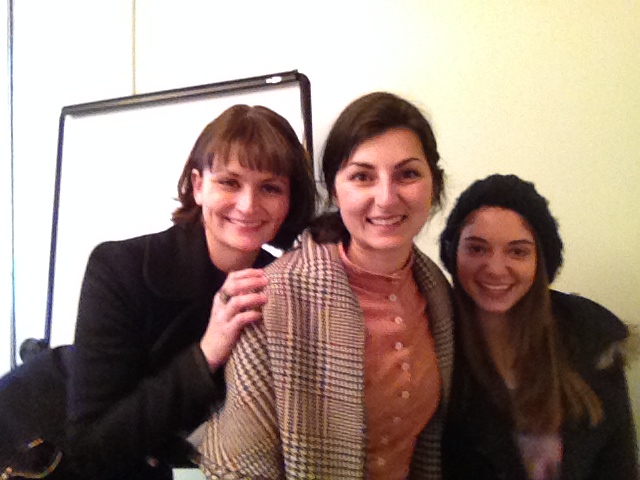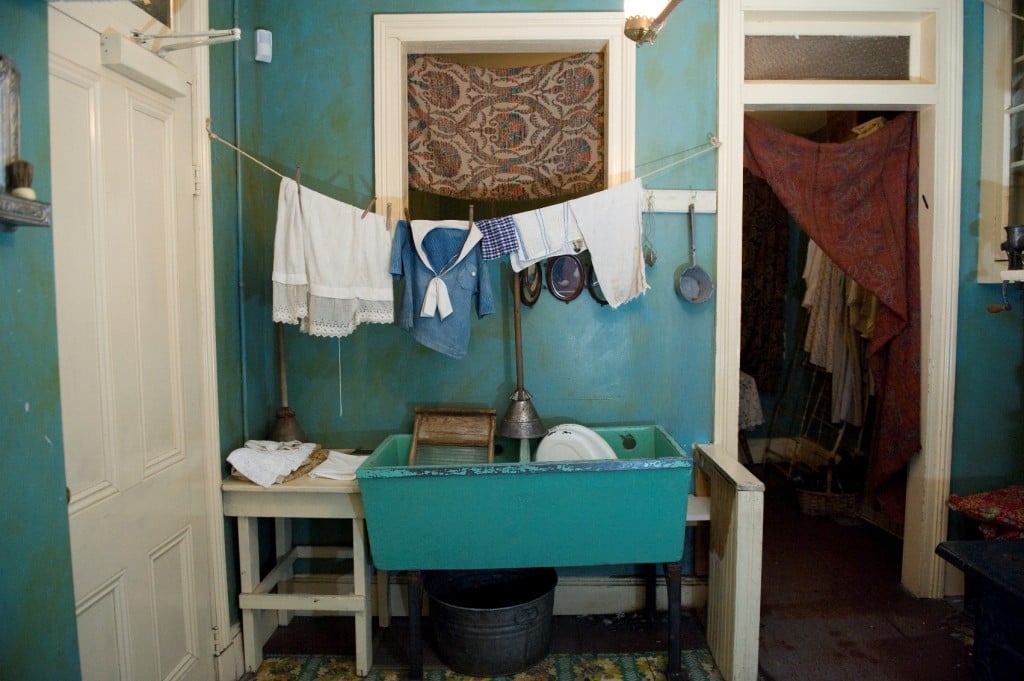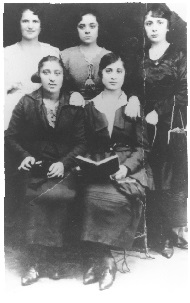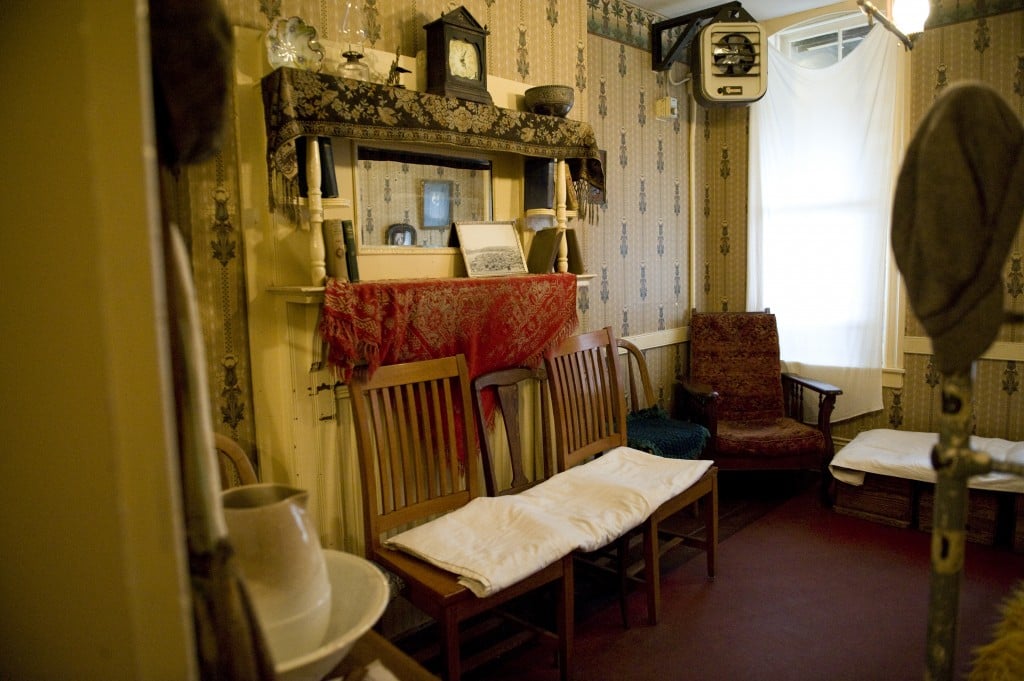Blog Archive
A Confino Family Reunion
On our “Meet Victoria” program, visitors meet and talk with a costumed interpreter portraying Victoria Confino, a 14-year-old girl who lived at 97 Orchard Street in 1916. On March 1st, our Victoria had a very special guest – her great-granddaughter, Celia, who is the granddaughter of real-life Victoria’s son Lenny Cohen. Celia’s Girl Scout troop came all the way from Virginia for a visit to the Tenement Museum. Education Assistant for Costumed Interpretation (and Victoria interpreter) Jess Varma sat down with Celia and Kim, Celia’s Girl Scout Leader, for a few questions afterwards.
Jess: So, you never met your great-grandmother?
Celia: No, she died when my mom was my age.
Jess [Looking over recipe for Victoria’s Passover spinach pie that Celia brought with her]: You know, your family’s stories about what these Sephardic recipes actually taste like, and what’s in them are so useful to us because there’s no book that says ‘This is what’s in this.’
Celia: I don’t know who wrote those down, maybe my grandmother? I don’t think my grandfather cooked…When I knew him, he died last year, he never really cooked from what I remember…
Jess: What was your grandfather like?
Celia: He was always very funny. He always made us laugh; singing songs, making jokes.
Jess: He was a physicist, right?
Celia: Yeah, one of the tour guides was mentioning that one of Victoria’s children went on to work at NASA, and I was like “That’s him…”
Jess: That’s something that I think about a lot, is that Victoria herself only went to school for two years, and her son, your grandfather, Became a physicist for NASA.
Celia: It’s incredible.

The kitchen in the Tenement Museum's Confino apartment, where we imagine there would have been plenty of spinach pie being made.
Jess: What do you think about the fact that there’s a program in a museum about your family?
Celia: Every time I tell my friends that I’m coming to New York… I tell my friends that the museum, the tenement, was my great-grandmother’s, and they say ‘That’s so cool!’
Jess: The point of this museum is that all of us have stories. Any of the girls in the troop, their great-grandmothers did something that was a part of what makes us who we are today. You’re 14, so you having kids is in your future, but what would you want to pass on to your kids about your family?
Celia: Definitely taking them on this tour, and making sure that they care and are involved. I know that my mom really cares, and wants me to be involved, so I don’t want my kids to be like “Yeah, whatever” and just let it go. I want it to stay in our family.
Jess: Why is that important to you? What about it?
Celia: Yeah, I don’t know. It’s history and it’s family, and it’s cool! I love [Victoria’s] accent.
Jess: Do you know Spanish? Do you take Spanish at school?
Celia: No, I take French. No one in my family really speaks Spanish.
Jess: Well, you know what’s really interesting is that Victoria’s dad spoke French. Her older brother Joseph would have had to go to Salonika, which was the next big town from Kastoria, to go to a school that was run by these French Jewish philanthropists, so he spoke French. And there’s French in Ladino, because it’s this mishmash of all these different languages, so one thing we think Victoria may have said when she answered the door was ‘Bonjour.’ And she says ‘merci mucho’ when she wants to say thank you. And apparently, Victoria, when she was older, loved going to restaurants and speaking to the wait staff using Spanish words from Ladino, and they were like ‘Who is this old Jewish lady who speaks Spanish?’
Kim: And did she speak Yiddish?
Jess: Not that we know of. The only reason that she would have spoken Yiddish is if she picked some up living here in this building because Sephardic Jews don’t speak Yiddish. It’s kind of funny, because in a lot of ways, I know more about your family than I do about my own family. It’s really interesting and kind of moving to meet you and think ‘oh, [Victoria] was a real person. She got older and had children, and those children had children.’
Kim: She’s your tangible tie… It’s very exciting. Like she was saying how there were thousands of people here, and your family was smart enough to remember and put together those memories so this place could use that. I think that’s really cool.
Celia: When I was younger, before we came the second time, we came when I was like two, so I don’t remember it. My mom would tell me about the tour and I would tell my friends that my great-grandmother is famous, and they were like ‘That’s not true.’ They wouldn’t believe me! And I was like ‘No, it is!’
Jess: It is true! She’s kind of a superstar. I sometimes get recognized by school kids in New York. I’ll just be walking down the block by a school, and they’ll be like ‘It’s Victoria!’ So yeah, she’s famous.

Jess Varma, Elly Burke, the interpreter who played Victoria, and Celia, Victoria's great-granddaughter.
Celia’s mom, Yael, also told us a little about Victoria and the Confino legacy: “Victoria died in 1989, when I was 21. My Dad’s [Lenny, Victoria’s son] health declined over the last 6-7 years. By the time [Celia] would’ve asked questions [about Victoria], as a family we were focusing on how he was doing. About the cooking; growing up, my dad did do most of the cooking. I don’t think anything was written down until my mom nudged him to, so my brothers and I could have copies. Celia was too young to remember him cooking. I don’t think she remembers Passover Seders at the family home in Greenbelt, MD, where we all squeezed in, including grandchildren.”
Thanks so much for coming, Celia!
– Posted by Jess Varma


